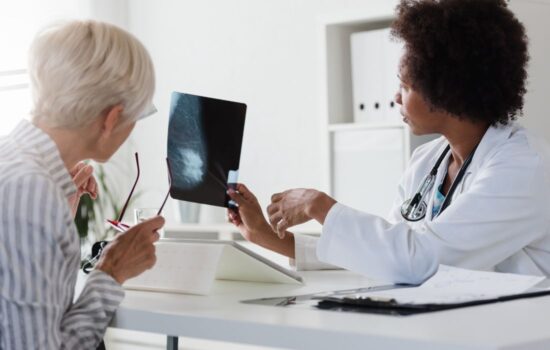May 8, 2023
How are Treatments Different for Recurrent Breast Cancer?

Recurrent breast cancer can return locally, in nearby lymph nodes or in distant organs and often requires a different treatment approach than the original diagnosis. Cancer Care Centers of Brevard oncologists explain the signs of breast cancer returning, how it is diagnosed, and treatment options like hormone therapy, targeted therapy, immunotherapy and chemotherapy.
Breast cancer that returns after treatment has been completed is called recurrent breast cancer. If it comes back, it’s most likely to happen one to three years after cancer treatment. Recurring breast cancers can be aggressive and difficult to treat.
Returning cancer can be local (recurring in the same breast), regional (in lymph nodes close to the breast), or in a distant area of the body. Treatment for recurrent breast cancer is typically different from your initial breast cancer treatment.
Determining if Breast Cancer Has Returned
Your doctor may find recurrent breast cancer during a routine physical or mammogram. Or you may notice new symptoms.
A local recurrence can include these symptoms:
A lump or irregular area of firmness
Skin changes
Skin inflammation
Nipple discharge
If the cancer recurs in the chest wall after a mastectomy, symptoms may include nodules under the skin or a new area of thickness near the mastectomy scar.
Regional recurrence may include a lump or swelling in lymph nodes in the neck, around the collarbone, or under the arm.
A distant recurrence that develops in the bones, liver, or lungs can cause these symptoms:
Pain that doesn’t go away or worsens
Severe headaches
Persistent cough
Breathing problems
Appetite loss
Weight loss
Seizures
Contact your breast cancer specialist right away for testing to confirm, or rule out, potential recurrent breast cancer.
What Causes Breast Cancer Recurrence?
Cancer recurrence is usually caused by cancer cells that weren’t destroyed or killed by your initial treatments and start growing rapidly.
Recurrence can also be caused by cells from your original cancer that separated from the tumor but stayed dormant. While doctors don’t completely understand why, these cells can reactivate and start growing out of control, becoming cancerous.
Factors that Increase the Risk of Breast Cancer Recurrence
There are several factors that can increase the risk of recurrent breast cancer. This includes the initial diagnosis of breast cancer, tumor size, stage at diagnosis, lymph node involvement, and age (being younger than 35 at diagnosis).
The risk of recurrence also increases if you smoke, are overweight, don’t get regular physical activity, and have poor overall health. Not having radiation after a lumpectomy or endocrine therapy for hormone receptor-positive breast cancer also increases recurrent cancer risk.
Inflammatory or triple-negative breast cancers are the most likely to recur.
How is Recurring Cancer Diagnosed?
Your individual symptoms and previous history of breast cancer will determine which diagnostic tests and procedures you’ll need. They can include:
Imaging tests such as X-rays, magnetic resonance imaging (MRI), computerized tomography (CT scan), positron emission tomography (PET scan), or bone scan
A biopsy is the removal of a sample of suspicious cells and testing them in a laboratory. The lab pathologist can determine if the tissue is a recurring or a new cancer and if the recurrent cancer is sensitive to hormone treatment or targeted therapy. A biopsy is the only way to confirm recurrent breast cancer.
What Factors Determine the Type of Treatment Used When Breast Cancer Returns?
Several factors determine treatment options for recurrent breast cancer, including:
Tumor location
Tumor’s sensitivity to hormone treatment or targeted therapy
Extent of cancer
Treatments you had for a previous cancer. For instance, radiation therapy can only be given in certain doses over the course of your lifetime, limiting its use in recurrent breast cancer. Tumors can also develop an immunity to previous treatments making it necessary to change to a different treatment approach.
Your overall health condition
Your goal for treatment
It’s important to work with your breast cancer doctor to determine which treatment options are right for you.
Treating Local Recurrence of Breast Cancer
For women whose breast cancer has recurred locally, treatment options depend on their initial treatment.
Mastectomy (breast removal) may be recommended if you previously had a lumpectomy to preserve the breast. If you initially had a mastectomy, a cancer recurrence near the mastectomy is treated by removal of the tumor plus a margin of healthy tissue. Lymph nodes will be removed if they weren't removed previously.
Radiation therapy may be recommended after surgery if you didn’t have it previously. Because of the side effects, you probably won’t have radiation again if you had it after a lumpectomy.
Hormone therapy, targeted therapy, immunotherapy, chemotherapy, or a combination of these may be recommended after surgery and/or radiation. They’re used first if surgery or radiation is not possible.
Hormone therapy uses medications to block estrogen and progesterone’s growth-promoting effect on cancer cells. Hormone therapy can kill cancer cells anywhere in the body if they’re hormone-receptor-positive.
Targeted therapy focuses on cancer cells that produce excess HER2 protein, which allows breast cancer cells to grow, spread, and live longer. Targeted medications enter the blood and can reach all areas of the body. Targeted drugs may work when chemotherapy is not effective and make other types of treatment more effective.
RELATED READING:
HER2-Low Breast Cancer Treatment Breakthrough for Inoperable or Metastatic Breast Cancer

Immunotherapy uses medications to boost your immune system, helping it more effectively kill cancer cells. Some immunotherapy medications are considered targeted therapy because they block a specific protein and limit cancer growth.
Chemotherapy, which uses drugs to kill cancer cells, may be used to reduce your risk of additional cancer recurrence.
Treating Regional Breast Cancer Recurrence
Regional recurrence is breast cancer that returns in the area around the breast, often in the lymph nodes under the arm or around the collarbone. Treatments for regional breast cancer recurrence include:
Surgery, the most common treatment, removes cancerous lymph nodes if not removed previously.
Radiation therapy is sometimes used after surgery. If surgery isn't possible, radiation therapy may be the main treatment if you didn’t have radiation with your initial cancer treatment. The amount of radiation that can be used depends on the amount given in the initial treatment phase.
Drug treatments, including chemotherapy, targeted therapy, or hormone therapy, may be recommended as the main treatment for regional recurrent cancer. They may also be used after surgery or radiation.
Treating Distant Recurrence of Breast Cancer
A distant recurrence of breast cancer is the most difficult type to treat. Its most common sites are bones, lungs, or brain.
Treatment methods depend on the recurring cancer’s location. The treatment goal of distantly recurring breast cancer is not to cure but to extend the patient’s life and help relieve symptoms and side effects. Treatment balances sufficient medication to control symptoms with minimizing the medication’s toxic effects. Treatments may include:
Hormone therapy is often the first treatment if your cancer is hormone receptor-positive. It has fewer side effects compared to chemotherapy.
Chemotherapy is used if your cancer is hormone receptor-negative or if hormone therapy has stopped working.
Targeted therapy works well if your cancer cells are receptive to targeted medications.
Immunotherapy helps your immune system fight cancer by interfering with the cell proteins that help cancer cells hide from immune system cells. Immunotherapy may also be combined with chemotherapy.
Bone-building medications can reduce your risk of bone fractures and reduce bone pain.
Radiation therapy can be used to control symptoms.
Treatment for Recurrent Breast Cancer in Brevard County
Thanks to extensive breast cancer research, including clinical trials available through Cancer Care Centers of Brevard (CCCB), there are new treatments being approved by the FDA to assist with metastatic and recurrent breast cancer. This brings new hope for many patients diagnosed with recurrent breast cancer.
If you or a loved one has been diagnosed with recurrent breast cancer, our team of specialists in Melbourne, Merritt Island, Palm Bay, and Rockledge, Florida, are available for a consultation about the best treatment plan for you.
Categories: Breast Cancer